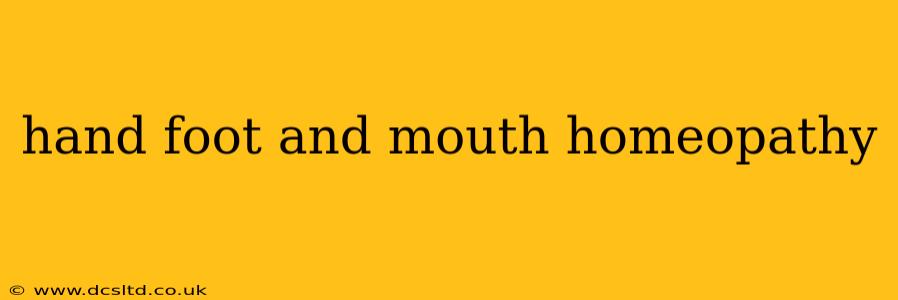Hand, foot, and mouth disease (HFMD) is a common viral infection, primarily affecting young children. Characterized by a fever, painful sores in the mouth, and a rash on the hands and feet, it's a highly contagious illness spread through close contact with infected saliva, mucus, or stool. While conventional treatment focuses on managing symptoms, many parents seek alternative approaches like homeopathy. This article explores the homeopathic perspective on HFMD, addressing common questions and concerns.
What are the common symptoms of hand, foot, and mouth disease?
HFMD typically presents with a range of symptoms. These usually begin with a mild fever, followed by the development of painful sores (vesicles) inside the mouth, on the tongue, gums, and throat. These sores can make eating and drinking difficult. A characteristic rash then appears on the hands and feet, often accompanied by blisters. The rash can sometimes spread to the buttocks and legs. While most cases are mild and resolve within 7-10 days, some individuals may experience more severe symptoms. It's crucial to consult a healthcare professional for diagnosis and to rule out other potential illnesses.
What is the homeopathic approach to treating hand, foot, and mouth disease?
Homeopathy, a holistic system of medicine, focuses on treating the individual, not just the disease. A homeopathic practitioner will assess the totality of symptoms – physical, emotional, and mental – to select the most appropriate remedy. This involves considering the unique presentation of the illness in each patient. There isn't a single "cure-all" homeopathic remedy for HFMD; the choice of remedy depends on the individual's symptom profile. Some commonly used remedies might include Aconite, Belladonna, Phytolacca, or Rhus toxicodendron, but the selection is highly individualized and should be made by a qualified homeopath. It’s important to understand that homeopathic treatment does not replace conventional medical care, especially for severe cases.
Can homeopathy prevent hand, foot, and mouth disease?
While homeopathy can help manage symptoms and potentially shorten the duration of illness, there is no scientific evidence supporting its preventative capabilities for HFMD. Preventing the spread of HFMD relies on good hygiene practices, such as frequent handwashing, avoiding close contact with infected individuals, and promptly cleaning contaminated surfaces.
How long does hand, foot, and mouth disease last?
The duration of HFMD typically ranges from 7 to 10 days. However, some symptoms, like the rash, might linger for a bit longer. The fever usually subsides within a few days, while mouth sores heal within a week or so.
Is homeopathy safe for children with hand, foot, and mouth disease?
Homeopathic remedies are generally considered safe for children, but it's essential to consult a qualified and experienced homeopathic practitioner. They can properly assess your child's symptoms and select the appropriate remedy. It's crucial to inform the homeopath about any other medications your child is taking. Remember, homeopathy is not a substitute for conventional medical care, particularly for severe or complicated cases.
What are the potential benefits of homeopathy for hand, foot, and mouth disease?
Some parents report that homeopathic treatment helps alleviate the discomfort associated with HFMD, including mouth sores and fever. However, rigorous scientific evidence supporting these claims is limited. The perceived benefits might be due to the placebo effect or the self-limiting nature of the illness. It's important to manage expectations and understand that homeopathy is not a guaranteed cure.
What are the potential side effects of homeopathy for hand, foot, and mouth disease?
Homeopathic remedies are generally considered safe and have minimal side effects. However, allergic reactions to specific ingredients are possible. It's always best to consult with a qualified practitioner before starting any homeopathic treatment, particularly for children.
Should I use homeopathy instead of conventional medicine for hand, foot, and mouth disease?
Homeopathy can be used in conjunction with conventional medical care to manage symptoms, but it shouldn't replace it entirely, especially for severe cases. Conventional medicine provides effective treatments for complications that might arise. Always consult your pediatrician or healthcare provider for diagnosis and appropriate medical care, particularly for infants, young children, and individuals with weakened immune systems. A holistic approach that combines conventional medical treatments with complementary therapies like homeopathy can provide comprehensive care.
Disclaimer: This information is for educational purposes only and should not be considered medical advice. Always consult with a qualified healthcare professional before making any decisions related to your health or the health of your child. The views expressed here do not represent a medical endorsement of homeopathy.
